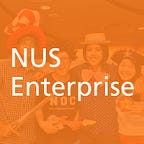Repurposing food-waste to grow wonders
How can okara, a by-product of the soya food industry, be repurposed as a new product to help grow healthier crops? Through leveraging on the expertise from the National University of Singapore (NUS), Singapore’s leading research and educational institution, NuSoil’s founders developed an okara-derived hydrogel, which retains water in soil for better plant growth.
An environmentally friendly, biodegradable soil supplement
Okara is often treated as food waste and discarded. Singapore produces around 10,000 tonnes of okara a year, of which 80% is thrown away*. However, scientists and researchers are exploring ways to recycle okara for other purposes.
Dr Tan Wee Kee and Dr Zhu Jingling were researching okara when they discovered that they could repurpose food to generate more food. By creating an okara-derived hydrogel customised for soil amendment, their product, InnoGro®, minimises leaching and locks in nutrients, thus acting as mini-reservoirs, allowing plants to tap on the water and fertiliser reserves in the soil for longer periods of time.
Helping farmers to save costs and improve profits
Their research showed that the okara-derived hydrogel enabled plants to survive better and grow much faster under water-limited conditions, allowing farmers to save on water resources (50%) through improved efficiency in water usage. Not only does InnoGro® help to retain water in the soil, it also reduces watering frequency. Instead of watering once a day, farmers would only need to water their plants once a week after the application of InnoGro®. This is exceptionally useful in areas where rainfall is irregular or during dry spells. In addition, the hydrogel is biodegradable and produced with green technology, which is highly eco-friendly. All these benefits are ideal for sustainable crop cultivation in the long run.
Learning entrepreneurship
“It was quite incidental. We started off, not because we wanted to go into entrepreneurship, but because we were trying to solve some logistical issues related to our research on the okara-derived hydrogel (InnoGro®),” recall the two founders. Led by circumstances and through the NUS Graduate Research and Innovation Programme (GRIP), the founders were introduced to the world beyond research.
The duo, who were NUS researchers at that time, did not have much knowledge about business and entrepreneurship. However, the foundation of NuSoil was developed by GRIP through intensive but systematic learning, hand-holding mentorship and industry networking. The venture manager and commercial champion assigned to the team also played a pivotal role in nurturing the duo.
“With the wide connections to the commercial sectors, we were exposed to arenas and contacts that would not be possible based on our field of research work,” Dr Tan points out.
At the start, the duo were also unsure of how to develop a pilot line for scaling up production. Their solution was first developed in a very small-scale research lab and they could not produce enough to meet the demand for a field test. “With the help from GRIP, we worked with Master Engineers from the NUS MVP Studio and a prototyping vendor to build a pilot system,” shares Dr Tan.
From a researcher to an entrepreneur
The founders have another recommendation to share: “As an entrepreneur, always remember to never give up. Believe in yourself, persevere and you can do it!” Today, the fast-growing start-up has received interest from various entities in Singapore and overseas. In 2019, NuSoil was among the first 15 GRIP deep tech start-ups who received $100,000 in seed funding by NUS. In the same year, they were selected from over 2,400 applicants to be one of SLINGSHOT 2019’s TOP 100 Global Start-ups. In 2021, NuSoil was awarded a $250,000 grant to further develop their solution.
Right: Dr Tan (pictured right, purple mask) was introducing NuSoil’s technology to NUS President Professor Tan Eng Chye.
Presently, they are undergoing field trials while being incubated at NUS Enterprise’s newest innovation and incubation facility, the NUS Agritech Centre, where they are rigorously testing the efficacy of InnoGro® under different settings and conditions.
“We intend to build on InnoGro® and are actively engaging with potential customers leading to long-term relationships with like-minded partners. Our goal is not just to do a good job on the field trials to work towards commercialisation, but to expand its application and usage to new innovative products,” say NuSoil’s founders.
Inspired to kickstart your own entrepreneurship journey? Find out how NUS Enterprise supports aspiring entrepreneurs and start-ups to transform their ideas into purposeful solutions with international impact: https://enterprise.nus.edu.sg/
*According to NUS Food Science & Technology Associate Professor Liu Shao Quan. View the original source from The Straits Times here.
